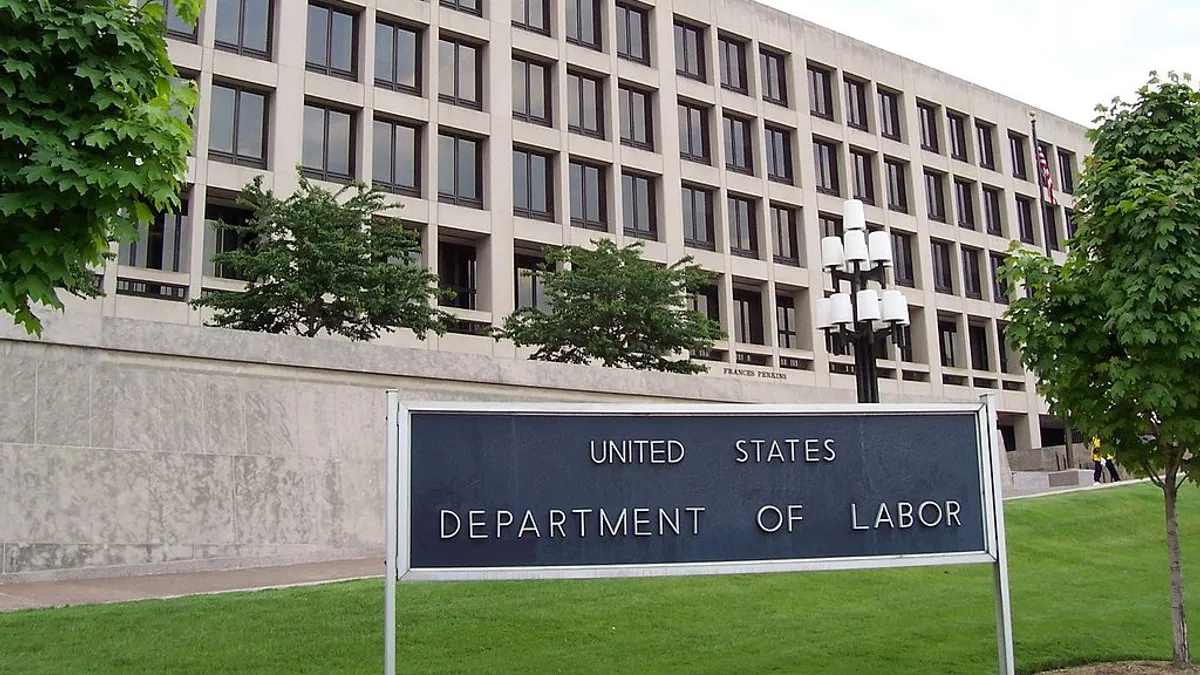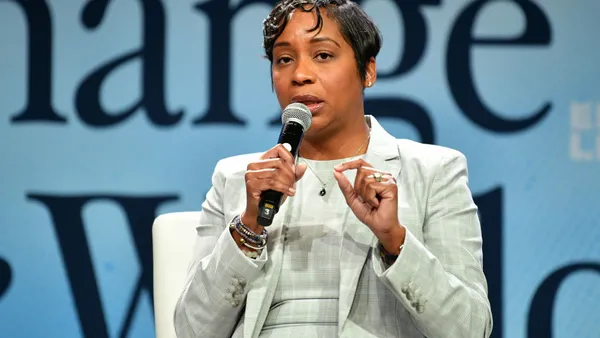Dive Brief:
- The U.S. Department of Labor (DOL) announced Monday a proposed rule that would update Fair Labor Standards Act (FLSA) joint employment regulations. The rules govern situations in which multiple employers can be held liable for wage and hour violations.
- The proposal includes a "four-factor balancing test" the agency said is derived from a federal court's ruling in Bonnette v. California Health & Welfare Agency (Nos. 81-4565, 82-4174 (9th Cir. June 22, 1983)); "[a] plurality of circuit courts use or incorporate Bonnette's factors in their joint-employer test," DOL said. The four factors assess whether an alleged joint employer: 1) hires or fires the employee in question; 2) supervises and controls the employee's work schedule or conditions of employment; 3) determines the employee's rate and method of payment; and 4) maintains the employee's employment records.
- The agency also said its proposal will explain that other factors may be relevant if the initial factors show the alleged joint employer: a) exercises significant control over the terms and conditions of the employee's work; or b) otherwise acts directly or indirectly in the interest of the employer in relation to the employee. Whether an employee is economically dependent on the potential joint employer is "not relevant" in determining that employer's economic reality under FLSA, DOL said: "Accordingly, to determine joint employer status, no factors should be used to assess economic dependence."
Dive Insight:
If adopted, the rule would represent a major update to federal labor regulations in an area of law that has become increasingly murky and contentious due to an increase in the use of independent contractors, staffing agencies and other similar workforce models. Joint employer questions have plagued industries in which franchising is prevalent, including fast food, but DOL said an entity's business model — including a franchise model — should not "make joint employer status more or less likely under the Act."
The proposed measure could reduce liability for major franchised restaurant chains like McDonald's. "It will allow franchisors to ensure that their franchisees are exercising good practices and good policies and procedures without putting on them the burden that they would be responsible for everything that franchisee might do," Liz Washko, shareholder of the hospitality practice at law firm Ogletree, Deakins, Nash, Smoak & Stewart P.C., told Nation's Restaurant News.
DOL is also making a modification of one factor in the Bonnette test in its proposal, Mark Kisicki, shareholder at Ogletree Deakins, told HR Dive in an interview. The 9th Circuit emphasized a joint employer's potential to act with respect to an employee's terms and conditions of employment. But DOL, he said, is instead focusing on the active exercise of control. "Only actions taken with respect to the employee's terms and conditions of employment, rather than the theoretical ability to do so under a contract, are relevant to joint employer status under the Act," DOL's proposal said.
The proposal also is a rebuke of the Obama administration's since-rescinded 2015 guidance on joint employment. That guidance favored a six-factor economic realities test, which proved controversial with employers and their advocates.
DOL's rule also follows a separate joint employer rulemaking effort by the National Labor Relations Board (NLRB) implementing the National Labor Relations Act. Both agencies' rules include similar language, couching the definition of a joint employer in what NLRB calls the essential terms and conditions of employment, including hiring, firing and supervision of an employee. The moves reflect an overall effort by labor officials in the Trump administration to set a higher bar for joint employment.
Experts have differed in their response to the regulations, with disagreement as to whether it would be more efficient to have one catch-all definition of joint employment for compliance purposes. The proposals to that effect have been put before Congress, but the presence of a Democratic majority in the House of Representatives makes the success of such legislation unlikely.
Employers shouldn't be too quick to make changes in response to the announcement, according to Kisicki. "There's going to be significant, and I would expect coordinated, challenges that I envision could be before the comment period ends," he said, adding that changes based on the proposal alone would be "premature." But Kisicki did believe the rule as written would set "a very clear line" that would be important for business groups.















